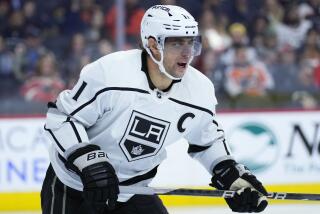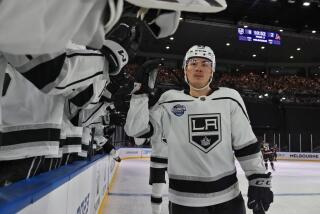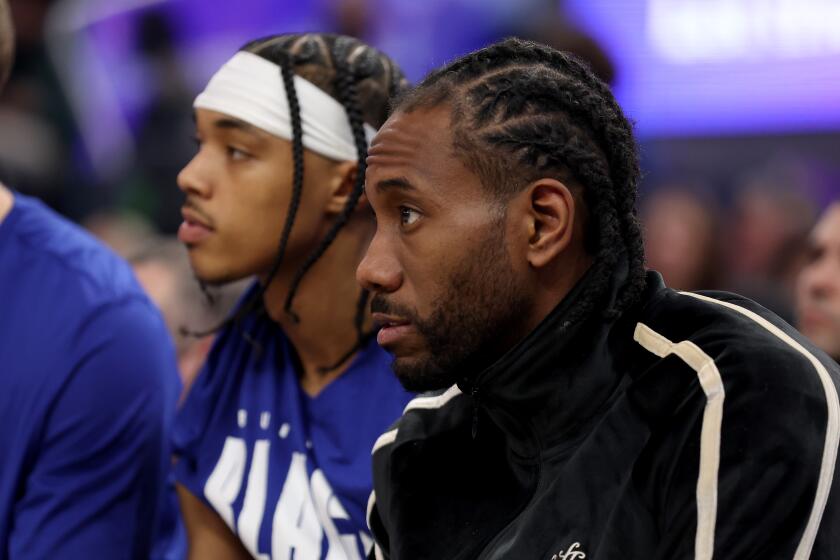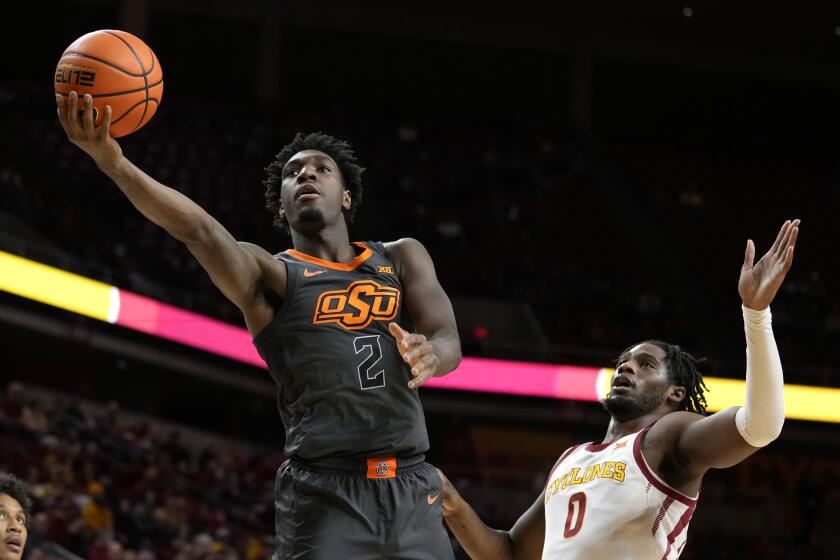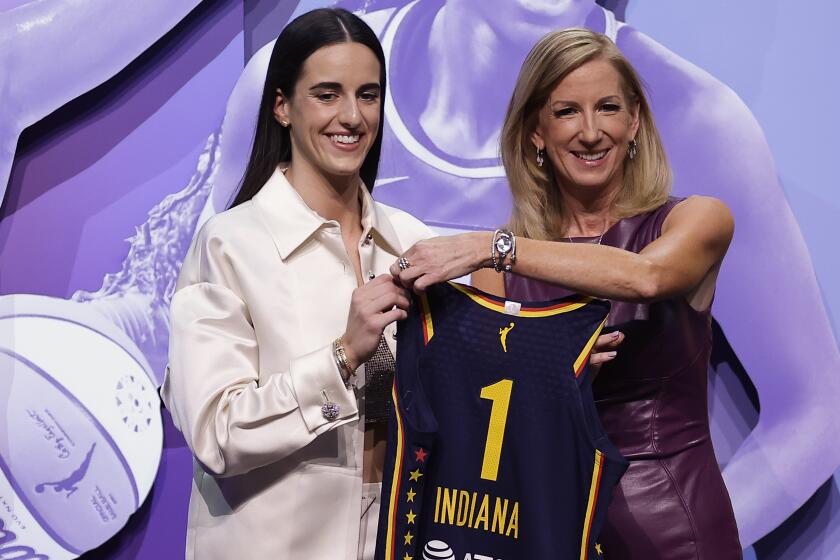NHL hopes outdoor games grow their financial coffers and fan base
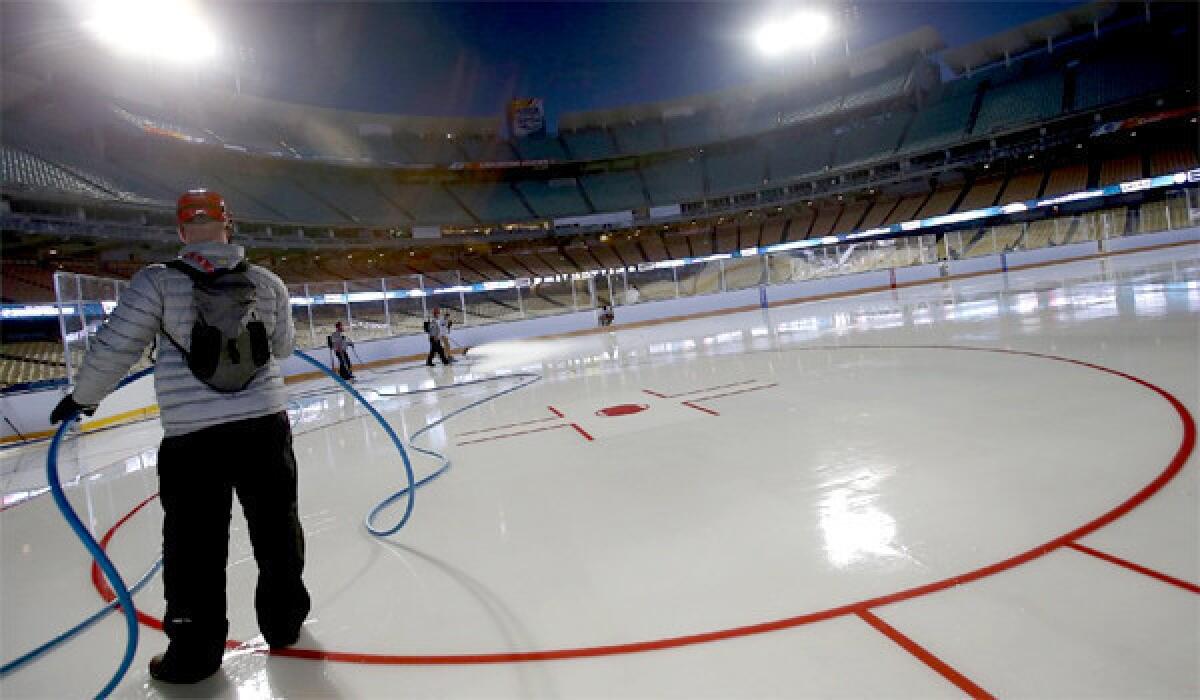
High prices and worries about poor sightlines have discouraged some Kings and Ducks fans, but anticipated anomalies, such as eating Dodger Dogs at a hockey game, have inspired more than 47,000 people to buy tickets to Saturday’s first-ever hockey game at Dodger Stadium.
The game, one of four upcoming outdoor hockey games, is expected to spotlight hockey and the upcoming Winter Olympics at a time when the nation’s attention is still on football.
“A Kings-Ducks game in the middle of the season, the ratings in L.A. will be tremendous,” said Kings President Luc Robitaille. “If it’s at Dodger Stadium and you’re sitting at home in Boston or Tampa Bay, you might say, ‘I’ll take a look at that,’ and, suddenly, middle-of-season games are events.”
Along with better connecting to fans online, big events are central to the NHL’s growth strategy. League executives hope that casual fans intrigued by the unprecedented slate of “stadium” games will become close followers of hockey after learning about regional rivalries and players’ patriotism.
Teams get most of their income from ticket sales. But with half the league selling out every home game, generating more revenue through local and national sponsors and advertisers is important. Raising fan base figures and television ratings would bring richer deals.
“Hockey is beginning to get its due,” said John Collins, the NHL’s chief operating officer. “An event like this allows the sport to be viewed as big as it is.”
Not long after being hired in 2007, Robitaille talked to Ducks counterpart Tim Ryan about playing an exhibition outdoors. At the same time, the NHL in 2008 began its Winter Classic tradition. The annual New Year’s Day game in a cold-weather city’s baseball or football stadium has drawn record TV ratings and generated positive reviews for reminding people about their childhood days playing hockey outdoors on the ice.
Robitaille shifted his attention, lobbying the NHL to bring a Winter Classic to Los Angeles. Momentum picked up as the Kings filled Staples Center and won their first Stanley Cup in 2012.
Late last year, with nearly every team having asked about an outdoor game, the league decided on having a Stadium Series of four outdoor games across the country’s three biggest media markets: New York, Los Angeles and Chicago.
Stephen Andon, a Nova Southeastern University humanities professor who’s studied the Winter Classic, said choosing its biggest markets and biggest rivalries should successfully raise the NHL’s national consciousness.
“In creating such a huge spectacle at Dodger Stadium, the NHL knows that novelty alone will attract the casual fan,” Andon said.
The Kings estimate that about 2.5 million hockey fans — split about 60-40 in favor of the Kings — are among the 13 million people living in Los Angeles and Orange counties.
The goal is to create an additional million hockey fans. About 35% of Kings fans are Latino and many are 20-somethings, but there’s room to grow in those categories and others.
“Financially, the trickle effect over the next couple of years will be huge,” Robitaille said.
Past games have shown that. The Pittsburgh Penguins say they doubled their fan base between 2009 and 2013 amid hosting a Winter Classic at a football stadium in 2011 and the NHL draft in 2012. A week of activities, including an alumni game and public skating, preceded the game.
“Almost every night on evening news, we had something different on there,” said Penguins Chief Executive David Morehouse. “What it did from a marketing standpoint was broaden the base of people turning their heads toward you.”
The impact in Los Angeles could be tempered because Dodger Stadium won’t play host to any events besides the game. A two-week trip for the Kings beforehand and the Olympics beginning two weeks after caused a scheduling crunch.
The league is organizing and funding the game. The event might gross about $20 million for the league, with 60% coming from selling tickets, 30% from sponsors and 10% from merchandise sales. Subtractions will include costs for rent, rink, entertainment, security and decoration. The Kings must also be compensated from money lost as a result of missing a Staples Center date.
Though he declined to be specific, Collins said that individual outdoor games are profitable. The larger emphasis is on doubling national revenues, tied to sponsorships and television deals, to 20% of all income. Reaching that percentage would put hockey’s soon-to-be $4-billion business on par with professional baseball’s $7-billion operation.
Robitaille hasn’t thought about hosting an outdoor game in future seasons. But if all works well, the league is open to events at iconic venues close to such competitive, small-market teams as San Jose or Minnesota. Some fans and media have objected to the large number of outdoor games. But Collins said that the concept won’t feel diluted or overdone on a local level.
Lee Ohanian, a UCLA economics professor who studies the business of sports, doubted that outdoor games in Southern California would become an annual tradition because of the high costs and potential detriment to loyal fans.
“Whether it’s hockey or any other product like DirecTV, there are always pricing and promotions to expand the customer base, but each one has traditionally been temporary,” he said.
The Dodger Stadium game would have been a day later on Sunday if not for the Grammy Awards that night.
A fan fest in the parking lot behind left field will begin about 4:30 p.m. as the sun is setting. Players should enter from the center-field fence two hours later, walking through a line of palm trees. A sand volleyball court is placed in left field. Right field will get a stage.
“You got to do it the L.A. way,” said Kings center Jarret Stoll, who went to a handful of Dodgers game this summer. He said his eyes might be open a little wider than usual, but the surroundings shouldn’t prove to be a distraction.
“It’s for our family and friends to have that special experience, and we’ll play the game and hopefully get the win,” he said.
Work on the 22-degree ice table is underway. A protective blanket will shield it from sunlight. Goals will sit near first base and third base, with benches in shallow center field.
The configuration makes the worst seats for baseball the best ones for hockey. At a recent Kings game, many fans said they are refusing to spend hundreds of dollars to be so much further from the action than at Staples Center.
Steve Yaguchi and his friend Gary Nishimura, both season ticket holders for 21 years, bought the special jersey being worn by players that night. But they couldn’t find a reason to attend.
“There’s not enough appeal for me when you can see it better on TV,” said Yaguchi, 55, of Torrance. “In Chicago or somewhere it’s snowing, it wouldn’t be as weird to pay Stanley Cup Finals’ prices to see something like this.”
Still, between Ducks fans buying about 10,000 tickets and Dodgers season ticket-holders taking some, 90% of the 53,000 available seats have been filled.
Scott Egbjerg, 53, a former Kings stick boy and 30-year season ticket holder, is among those eager to see the game work out. He’ll be sitting in the nosebleeds behind home plate.
“I’ve followed the Kings to London and Canada and around the U.S.,” he said. “Wherever they go, I go.”
Twitter: @peard33
More to Read
Get our high school sports newsletter
Prep Rally is devoted to the SoCal high school sports experience, bringing you scores, stories and a behind-the-scenes look at what makes prep sports so popular.
You may occasionally receive promotional content from the Los Angeles Times.
